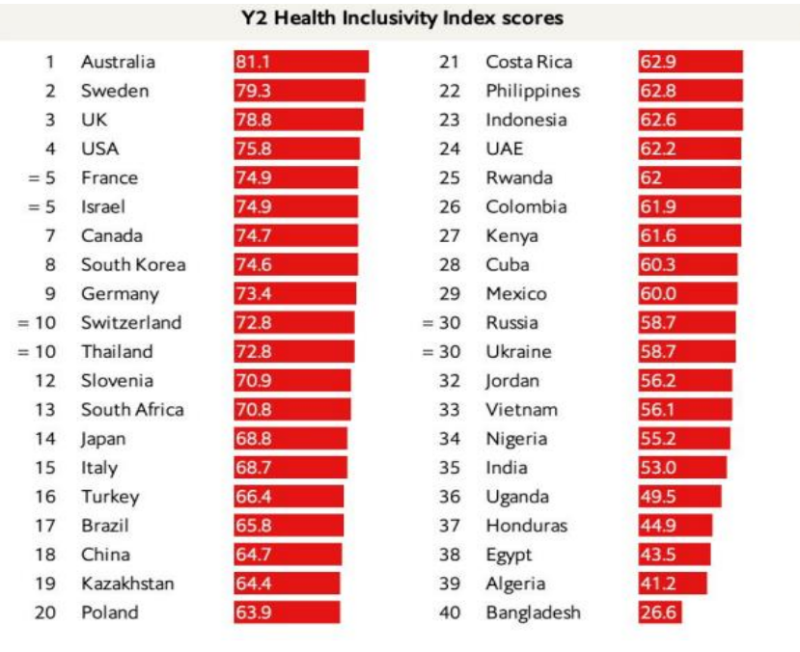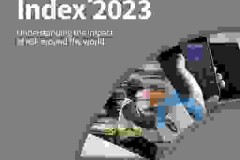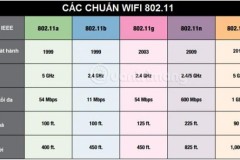- Phase two of Economist Impact’s Health Inclusivity Index, supported by Haleon, measures experience of health inclusion across 42,000 people in 40 countries
- Health inclusivity scores fall worldwide with addition of lived experience data, exposing glaring policy-practice gap in wealthy countries
- 66% of survey respondents experience barriers to health inclusion, with the most vulnerable worst affected
- Index reveals stark generational divide with Gen Z and Millennials experiencing greater barriers to access and higher levels of discrimination
LONDON, Nov. 21, 2023 (GLOBE NEWSWIRE) -- More than three in five people worldwide experience health exclusion, with vulnerable and younger populations the worst affected, according to phase two of the global Health Inclusivity Index from Economist Impact, supported by consumer health company Haleon.
This year’s study – which measures the extent and experience of health inclusion across 40 countries and 42,000 people – revealed that 66% of those surveyed face at least one barrier in accessing healthcare services. Lack of available appointments; inconvenient hours; distance and cost of travel; and lack of trust in healthcare services were the most widely reported barriers. Alarmingly, the Index also revealed that one in five people worldwide (20%) lack access to mental health services in their community, while 17% lack access to sexual health services.
The study suggests that younger generations face particular issues, with almost half of Gen Z (45%) stating their quality of care has been compromised as a result of their age, health status, or other personal factors, compared with 19% of Baby Boomers. Almost a third of Gen Z (28%) and Millennials (32%) report that their pain or health conditions are not taken seriously by healthcare professionals. While almost a quarter of Gen Z (21%) and Millennials (22%) report they’ve been completely denied access to healthcare, compared with just 8% of Baby Boomers.
Besides appointment hours and availability, together with distance and cost to travel, Gen Z are the most likely to cite lack of trust in healthcare providers and fear of discrimination as major obstacles when seeking healthcare services. 44% of Gen Z also cited social media as a trusted source of health information and advice – the highest proportion amongst all generations surveyed.
The most vulnerable populations, namely people from marginalised groups and those with chronic health conditions, also report being denied access to healthcare (26%). Discrimination is a key barrier, with more than a quarter (27%) of those from marginalised groups and people with chronic health conditions experiencing this when interacting with healthcare providers.
Sarah McDonald, VP Sustainability and Social Impact, Haleon, said: “With the Index revealing high rates of health exclusion worldwide, more action is needed to overcome the barriers, particularly for vulnerable populations. These latest findings reveal a clear gap between policy and experience, as the inclusive health ambitions of many of the world’s wealthiest countries are out of step with the reality of their citizens. As we saw in phase one of the research, the Index demonstrates that empowering people and communities to take care of their health is key. A greater focus on community services, self-care and health literacy programmes can boost inclusion, bringing better everyday health within reach of more people.”
The first phase of the Index, launched in 2022, examined the presence, coverage and effectiveness of inclusive healthcare systems, policies and programmes. The research methodology for 2023’s phase two study has been enhanced to include an assessment of people’s experience of these inputs – by capturing insights from 42,000 people to understand their experiences of health inclusion or exclusion.
With the addition of this lived experience data, health inclusivity scores have deteriorated under phase two of the Index across 85% of the countries surveyed. For example, the UK’s score fell by 13%, falling from first to third place, behind Australia and Sweden. With all but one country scoring below 80 out of 100, it’s clear that governments and policymakers have a long way to go in tackling health exclusion.
The declining scores year-on-year expose a policy-practice gap between governments’ ambitions of delivering inclusive health policies and systems and people’s real-life experience of them. High income countries display the largest gaps, with an average 18-point difference between their scores on inclusive health policies and people’s real-life experience, with Germany showing the greatest discrepancy. This reveals that many of the world’s wealthiest nations are struggling to deliver inclusive health policies and systems effectively, with marginalised and vulnerable populations at greatest risk of exclusion.
Jonathan Birdwell, Global Head of Policy and Insights, Economist Impact, said: “Measuring a country’s ability to provide quality healthcare involves evaluating its policy but also its population’s ability to use their healthcare services. That’s why we are pleased to add lived-experience indicators to Economist Impact’s Health Inclusivity Index. The results of this phase of the Index show that high-income countries still have a lot of improvements to make if they are to effectively turn their policy into action.”
In common with last year’s findings, phase two of the Index concludes that empowering people and communities to have greater agency over their own health is a key driver of inclusion. Low-and-middle income countries outperform wealthier countries in this area due to their focus on community-based services, self-care and health literacy programmes. For example, 73% of people in low-and-middle income countries have been given advice or information on managing their health at home, compared with 65% for high-income countries.
Consequently, low-middle income countries display an average policy-practice gap of just 3-points and are more effective at ensuring inclusion for marginalised groups, those with chronic health conditions and Gen Z. The fact that countries with less developed infrastructure, lower spending and fewer resources are more effective in delivering population-level health inclusivity in practice is a rich source of learning for both high-and lower-income countries.
As a global leader in consumer health, Haleon will leverage this and other learnings from the Index to engage governments, policymakers and partners around the globe and work together to tackle the biggest barriers to health inclusivity.
Under phase two of the Health Inclusivity Index, Australia achieves the highest score, followed by Sweden, UK, USA, France, Israel, Canada, South Korea, Germany, Switzerland and Thailand. The full findings of the Index can be found here: https://impact.economist.com/projects/health-inclusivity-index
| Media Contacts: | |
| Haleon Media Contact: Gemma Thomas gemma.x.thomas@haleon.com +44 (0) 7721376006 | Economist Impact Media Contact: Holly Donahue hollydonahue@economist.com |
Notes to Editors:
About Haleon and Health Inclusivity
Haleon’s social impact goal is to empower millions of people a year to be more included in opportunities for better everyday health – with the company aiming to reach 50 million people a year by 2025. During 2022, we empowered more than 22.4 million people.
We have identified three key barriers to health inclusivity that Haleon is well placed to help address, which are:
• health literacy;
• healthcare accessibility; and
• bias & prejudice
Examples of Haleon’s efforts to break down barriers to health inclusivity include:
Health Literacy:
Our Caltrate calcium supplement brand in China has run several initiatives to raise awareness of the risks of osteoporosis and how to actively prevent and manage it. This includes working with Health Professionals to reach more consumers through online education, in-person outreach and bone density tests.
Healthcare Accessibility:
To help make our brands more accessible, we have collaborated with Microsoft on expanding the functionality of their Seeing AI app for Haleon products. Seeing AI is a free mobile app that scans the information on product labels and reads it out loud. Consumers can scan the barcode on UK and US Haleon products and hear crucial information such as name, ingredients, and usage instructions.
Bias and Prejudice:
The Advil Pain Equity Project is a long-term commitment to champion equitable and accessible pain relief in the United States, created by Advil and launched in partnership with Morehouse School of Medicine and BLKHLTH. The Advil Pain Equity Project's first campaign, Believe My Pain, is focused on illuminating the issue of pain inequity in Black communities.
About Haleon
Haleon (LSE / NYSE: HLN) is a global leader in consumer health, with a purpose to deliver better everyday health with humanity. Haleon’s product portfolio spans five major categories - Oral Health, Pain Relief, Respiratory Health, Digestive Health and Other, and Vitamins, Minerals and Supplements (VMS). Its long-standing brands - such as Advil, Sensodyne, Panadol, Voltaren, Theraflu, Otrivin, Polident, parodontax and Centrum - are built on trusted science, innovation and deep human understanding.
For more information, please visit www.haleon.com
About Economist Impact
Economist Impact combines the rigour of a think-tank with the creativity of a media brand to engage a globally influential audience. We believe that evidence-based insights can open debate, broaden perspectives and catalyse progress. The services offered by Economist Impact previously existed within The Economist Group as separate entities, including EIU Thought Leadership, EIU Public Policy, Economist Events, El Studios and SignalNoise. Our track record spans 75 years across 205 countries. Along with creative storytelling, events expertise, design-thinking solutions and market-leading media products, we produce framework design, benchmarking, economic and social impact analysis, forecasting and scenario modelling, Press Release making Economist Impact's offering unique in the marketplace. Visit www.economistimpact.com for more information.
A photo accompanying this announcement is available at https://www.globenewswire.com/NewsRoom/AttachmentNg/a24060d5-eb9b-4fa1-8cbf-e5427cfaaa24


















